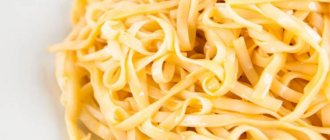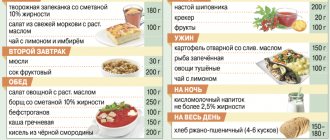The Mediterranean diet is a unique type of diet that received the status of intangible cultural heritage from UNESCO in 2013. In the mid-twentieth century, researchers noticed that Mediterranean residents were less likely to suffer from excess weight, diabetes and cardiovascular diseases, and these are the main risks that reduce life expectancy.
An explanation for this phenomenon was found in the special set of products and food intake that the inhabitants of the Mediterranean region historically adhered to. The term “Mediterranean diet” itself was introduced by American nutritionists Ansel and Case, who themselves adhered to this principle of nutrition and lived up to 97 and 100 years, respectively.
What do scientists think about it?
The results of various studies show that people who adhere to the Mediterranean diet are more likely to live longer
. One of its main components - olive oil - protects the liver from damage, and the nervous system from Alzheimer's disease and depression.
The ABCs of healthy eating
20 facts about how to eat right will help you build a balanced diet for health and well-being.
The abundance of natural spices used in the preparation of Mediterranean cuisine supplies the body with antioxidants. In fact, these are natural “preservatives” that protect cells from the destructive effects of free radicals and even cancer.
Who is allowed the Mediterranean regime and what are the contraindications?
All diets that are known today have various contraindications, but not this one. It is suitable for absolutely every person who cares about their appearance and health. This nutrition system refers to a low-fat carbon diet, which has an excellent balance of nutrients due to the consumption of cereals. Unsweetened fruits, vegetables, and berries bring a large variety of vitamins and beneficial minerals to the body. Cereals give a person fullness, and olive oil adds the necessary amount of vegetable fats to the body, which are very healthy. Also in this area, the consumption of seafood and fish is very common and popular. These products enrich the body with fish oil. And this is vitamin omega-3, thanks to which most residents of that area have beautiful, lush hair, beautiful skin, strong nails, teeth, and a healthy cardiovascular system. But you shouldn’t count on rapid weight loss by switching to a Mediterranean diet, since the diet is considered moderately reduced. But with such a diet, tissue sagging and skin folds do not appear.
Basic principles
Mediterranean cuisine is the complete opposite of the modern style of eating, which is based on the principle: “heat something, eat something.” The Mediterranean diet involves preparing food yourself without processing it beyond recognition. Aromatic spices are used frequently, but the dishes are never overly hot or spicy. Basil, oregano (oregano), rosemary
and other “Italian” seasonings known to us are intended only to highlight the taste of the dish, and not to make you want to wash it down immediately.
Nutrition principle
The diet will help you start losing weight if you follow the following nutritional rules:
- it is necessary to reduce the number of servings. Now 2/3 of the plate should be occupied by vegetables, and the remaining part should be equally divided between proteins and fats;
- All dishes must be prepared independently, do not eat semi-finished products;
- you need to monitor the composition of the products you buy: there should be no sugar, chemical additives, preservatives, dyes - only natural, high-quality food;
- meals should be divided: you need to make three main meals and two or three snacks. It turns out that the number of meals per day should be about 5-6 times.
The Mediterranean diet is quite varied, however, when taking it, it is necessary to constantly monitor your well-being: malaise, weakness, dizziness, migraines may indicate a lack of vitamins, minerals, and nutrients. Therefore, if you adhere to this diet, then only according to a ready-made menu for the month, compiled by a weight loss specialist.
The basis is carbohydrates
If you imagine a typical Mediterranean diet as an inverted pyramid, then at its base, occupying approximately 60 percent of the calorie content
, are carbohydrates.
But this is not sugar or white bread. Most often these are carbohydrates with a low glycemic index - unrefined cereals, durum wheat pasta, legumes and coarse bread. In addition, the diet of any Mediterranean resident is rich in vegetables and fruits, which supply fiber and antioxidants. How to apply
? You don’t have to look for expensive “authentic” pasta, couscous or bulgur in stores. Regular pearl barley or wheat groats, buckwheat, baked potatoes with skin, beans and lentils will become the basis of the Mediterranean lifestyle for the residents of Russia. Even rolled oats will work - but use ones made from whole grains more often. There is no need to buy exotic fruits and vegetables: green salads, carrots, apples, various types of cabbage and fresh herbs contain enough antioxidants to protect the body. Just try to choose seasonal fruits and vegetables - they contain the most nutrients.
Benefits of the Mediterranean Diet
The undeniable advantages of the Mediterranean diet , which has kept it on the wave of popularity for many years, are:
- a wide variety of both completely accessible and simple products, as well as gourmet products that can be consumed with maximum benefit for the body;
- a generally accepted fact is the connection of this type of diet with health indicators, in particular the normalization of blood pressure and a decrease in blood cholesterol levels;
- The Mediterranean diet is an integral part of a healthy lifestyle along with active leisure, quality sleep, and resistance to stress.
A large number of scientific studies have given rise to a list of the beneficial effects of the Mediterranean diet on the body:
- reduction in overall mortality - studies have shown that the diet can reduce overall mortality by 23%, coronary death by 39%, from cardiovascular diseases by 29%, from cancer by 10%; a combination of a Mediterranean diet, moderate alcohol consumption, regular physical activity with at least 30 minutes of exercise daily, and smoking cessation reduced overall mortality in old age by 65%;
- prevention of coronary disease - regular consumption of extra virgin olive oil improves the main risk factors for coronary heart disease (ligand profile, blood pressure, glucose metabolism and antithrombotic profile);
- prevention of Alzheimer's disease - consuming large amounts of fruits, vegetables, legumes, fish, as well as some alcohol and dairy products, reducing consumption of red meat and focusing on fish/seafood meat reduces the risk of Alzheimer's disease by 39-40%; in those who adhered to the diet partially, the risk of disease decreased by 15-20% compared with adherents of the American eating style;
- prevention of cancer - in countries where the typical Mediterranean diet is widely consumed in the general population, for example in Spain, Greece and Italy, the incidence of cancer is lower than in northern European countries;
- prevention of systemic inflammatory diseases - in the course of numerous experiments and prospective clinical studies, it was revealed that the positive effect of the Mediterranean diet is determined by a complex of factors acting in a synergistic and additive interaction.
A number of studies have been aimed at identifying a product that has a direct effect on one or another outcome of the diet, but neither olive oil, nor sea fish, nor seafood, nor natural spices and wines, nor frequent consumption of vegetables and fruits have been established as such a response. As a result, a conclusion was drawn. that it is the consumption of the entire variety of products described above in moderation and in combination with a healthy and active lifestyle that allows you to achieve maximum results.
About olive oil
An almost obligatory ingredient in Mediterranean dishes is olive oil. Not everyone can afford it, but if you decide to use it, don’t skimp – choose unrefined varieties
from well-known manufacturers.
They retain all the beneficial substances and microelements. However, the principle of “oil in all dishes” does not mean that you need to fry it and pour it into salads by the glass. Overcooked olive oil loses its beneficial properties, and there is even more fat in vegetable oils than in animal oils - up to 98 percent. Calories – up to 880 kcal per 100 g. Therefore, moderation
is another one of the principles of the Mediterranean diet.
Calculate your daily fat intake and normalize the amount of oil, taking into account other sources of fat. It is convenient to measure any vegetable oil with tablespoons - one contains 15-20 g
, depending on its size.
How to apply
?
Olive oil can be easily replaced with any unrefined vegetable oil - sunflower or soybean
. The Omega-3 fatty acid complex, which has a positive effect on the entire body, is found in almost all vegetable oils.
Dictionary
Water and vitamin deficiency, salt and the glycemic index, coffee and the list of “E” codes. Basic concepts, knowledge of which helps to form a balanced diet.
Reviews from those who have lost weight
Alina, 29 years old, Saratov: “The effect of the Mediterranean diet on the body has been well studied by doctors and nutritionists. Its benefits, effectiveness and safety have been proven by research. Therefore, I decided to choose it for weight loss. A diet is not suitable for quick results, but an improvement in well-being and a lack of heaviness in the stomach can be felt after 2-3 weeks.”
Galina, 32 years old, Perm: “The Mediterranean diet has been my main menu for 3 months now. There are no problems with health, the feeling of hunger does not bother me. The weight comes off gradually, about 0.5 kg per week. But the result is stable, and there is no desire to finish the diet and eat as quickly as possible.”
Yulia, 22 years old, Pskov: “The Mediterranean diet is a godsend for people with weak digestion. After other diets, constipation, flatulence, and abdominal pain began, but after this one, on the contrary, I felt better. I lost 5 kg in 2 months - it’s not suitable for express weight loss, but it will give a stable result.”
Dairy
In third place, occupying approximately 10 percent
of the diet, are dairy products.
True, due to the climate, Mediterraneans rarely consume whole milk or dairy desserts. The focus is on fermented milk products. Nobody includes fatty hard cheeses in their daily diet either. Traditional dairy products of the Mediterranean diet are low-fat yoghurts, young curd cheeses and curdled milk
.
How to apply
? Low-fat cottage cheese, yoghurts without sugar and fillers and kefir are very tasty. Sometimes you can treat yourself to quality hard cheese. It has a lot of calcium, but also a lot of fat and salt.
Sample menu for the week
The Mediterranean diet should be compiled taking into account personal financial capabilities and taste preferences, as well as the availability of seasonal products. Approximate weekly menu:
| Eating | Monday | Tuesday | Wednesday | Thursday | Friday | Saturday | Sunday |
| Breakfast | Muesli with dried fruits and milk (add honey if desired), sandwich with cheese, green tea | Cottage cheese casserole with apples, coffee | Omelette with cheese and tomatoes, orange | Buckwheat porridge with milk, sandwich with hard cheese and avocado | Curd soufflé with berries, tea | Oatmeal with grated apple, coffee | Boiled eggs, sandwich with soft cheese and herbs |
| Dinner | Chicken noodle soup, salmon baked in foil with assorted vegetables, 2 whole grain breads | Cheese soup with croutons, chicken risotto | Cream of broccoli soup, chicken breast meatballs, vegetable salad | Rice soup with veal, baked assorted vegetables with sour cream sauce | Pike perch soup with fish balls, pasta with tomato sauce | Mushroom soup, zucchini stuffed with veal and vegetables | Vegetable puree soup, baked chicken breast with lentil garnish |
| Snack | Natural yogurt, walnuts | Seasonal fruit salad with sour cream dressing | Dried apricots, prunes | Grated apple and carrot salad, dark chocolate | Apple, orange, pumpkin seeds | Cottage cheese casserole with apples and pumpkin | Assorted dried fruits and nuts |
| Dinner | Vegetable salad with seafood, buckwheat porridge | Bulgur, hake cutlets, vegetable slices | Baked salmon with baked beans | Stewed rabbit meat in sour cream sauce, vegetable salad | Chicken cutlets with rice, shrimp salad with avocado | Baked salmon fillet with cheese, buckwheat porridge | Vegetable salad with sour cream dressing, risotto with shrimp and mussels |
| Second snack | Cottage cheese with fresh apples | Kefir, green apple | Cottage cheese grated with sour cream | Greek yogurt | Kefir, tangerine | Kefir, apple | Cottage cheese with honey |
Dishes on the menu are interchangeable. You can add any type of food you like to it that suits your diet requirements.
Animal proteins
And finally, another 10 percent
comes from animal proteins - meat, fish and eggs.
About meat separately - in this food system it is used mainly to enhance the taste of dishes made from vegetables and grains. Mediterraneans practically do not use pork for daily cooking - most often chicken and lean beef are on the table. Fish dishes
are prepared several times a week.
Which, by the way, is fully consistent with the recommendations of the World Health Organization. There are few very fatty fish in the Mediterranean Sea that live in the north, and the diet of the inhabitants of this region does not include salmon or herring. But there is a lot of freshly caught low-fat fish and seafood, from which the first and second courses are prepared. How to apply
? A kilogram of frozen mussels costs less than a kilogram of pork fillet, and stores often sell live or chilled fish. The costs of purchasing and preparing it will more than pay off, because it is more profitable, tastier and healthier to cook from fresh products than from ready-made semi-finished products.
What to remember
The basis of the Mediterranean diet is carbohydrates.
Second place goes to olive oil. It is followed by animal proteins: dairy products, meat and fish. There is no need to chase “authentic” food - you can support this nutritional system with the help of products that are familiar from childhood. Tags:
- Heart and blood vessels
- Lifespan
- Diets
- Antioxidants
- Carbohydrates
- Complex carbohydrates
- Spices
- Weight loss
- Mediterranean diet
- Therapeutic diets
• To leave a comment you must be an authorized user
- likemarika is rice ok on this diet?
- inozeml Yes, everything is delicious and correct, only I have gastritis with high acidity. And I need to lose weight, and all foods useful for this purpose increase the secretion of gastric juice. In short, I don’t know how to eat.
- Zabolotnaya :))) comments atas, of course
- NNlov In general, you can eat everything natural without sweets and only when you are hungry. Then you will feel good and you will lose extra pounds (you also need to give your body exercise, and not just lie on the couch around the clock).
- NNlov All these diets and foreign recipes are nonsense. If you want to lose weight, eat when you are really hungry and eat as little sweets and fatty foods as possible, move more and try to cook yourself. Include buckwheat, rice, oatmeal, potatoes, pearl barley, semolina, millet porridge, and top quality pasta in your diet. It’s better to have boiled meat and don’t forget to eat fish.
- NNlov Choose natural products, check the expiration date. For example, if milk is stored for about a month, it means something has been mixed into it. I don’t argue that olive oil is more preferable to use than regular sunflower oil. But most importantly, the image of life that is suitable, for example, for a Japanese, is unacceptable for a Russian in central Russia. For a Russian person, our borscht or stewed cabbage will be much tastier and more nutritious than any foreign analogues from Polish cuisine.
- NNlov It’s not for nothing that they say “what’s good for a Russian is death for a German.” A person living in a certain area will benefit more from those fruits and vegetables that are grown on his land. I mean that those products that are brought to us from abroad (pears, tomatoes, bananas, apples, etc.) are treated with various chemicals and if you eat them you will get more harm than good. Therefore, I always try to eat food grown in my area and preferably from people who have dacha farming.
Real effect
In a week on the Mediterranean diet you can get rid of 4 - 5 kg of fat. Losing weight occurs without depression, deterioration of skin and hair. It is permissible to adhere to this method of eating for up to 14 days.
The Mediterranean diet helps Penelope Cruz and Sophia Loren stay fit. Their slimness is a sufficient reason to trust this method of nutrition. And the benefits received for many become a reason to stick to it even after losing weight, simply for the sake of health.











